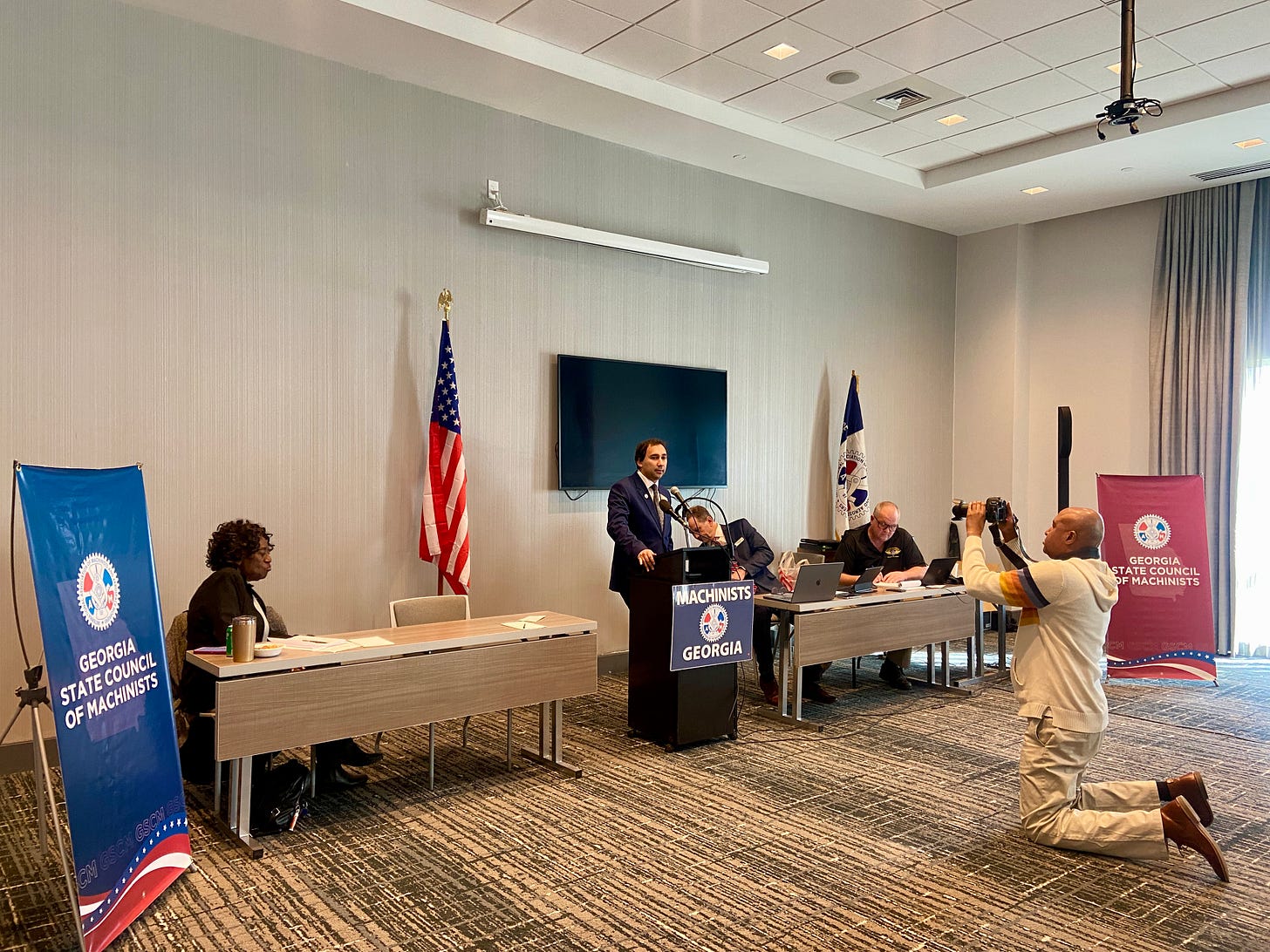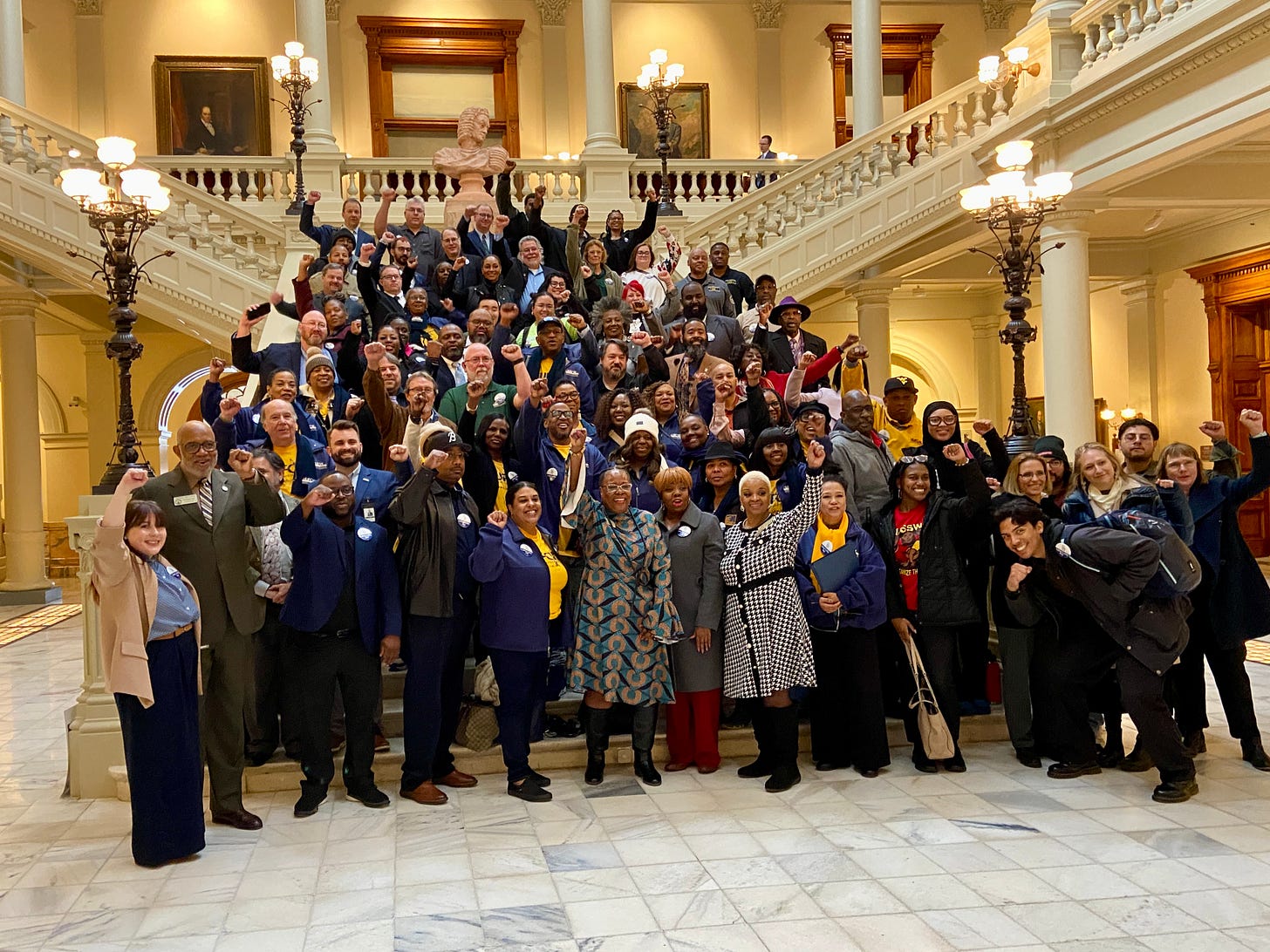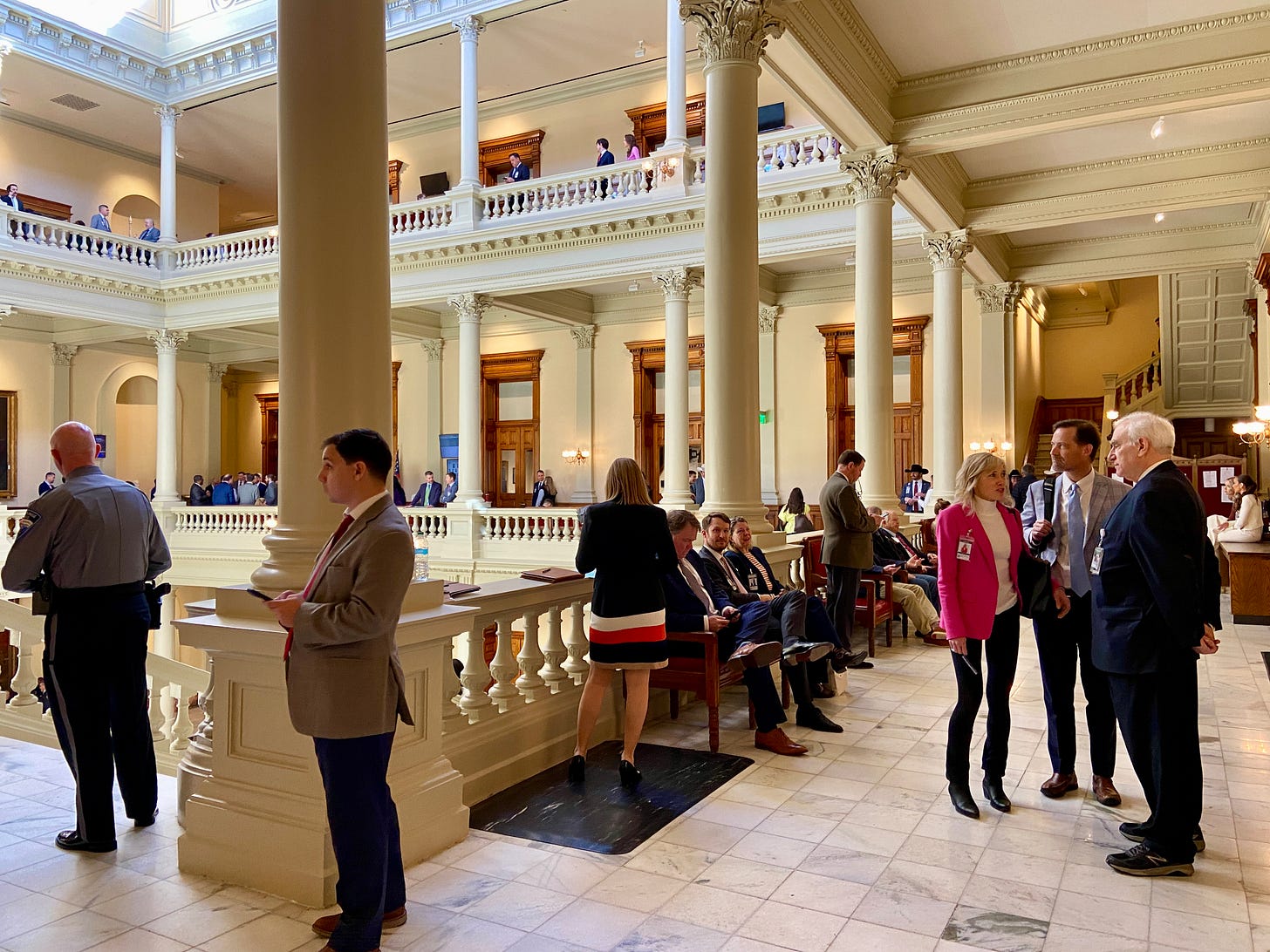Local Politics with the Machinists Union in its Southern Hometown
I had the pleasure of getting under the Gold Dome at Georgia’s General Assembly with the Machinists union, a Democratic Socialist, and a lot of lobbyists.
I’m grateful to have recently been invited to the Machinists (IAM) union’s legislative conference here in Georgia, three days in which local lawmakers and allies addressed delegates from Machinists shops across the state, who then, on their final day, bused off to the Georgia state Capitol to snap photos and chat with their state representatives. They were there to remind lawmakers that, even in a conservative so-called “right-to-work” state that batters organized labor, their union indeed exists and is taking notes of who stands with them when it comes to matters affecting working people.
Some backstory of why my beat intersects with the Machinists: The IAM is the largest union at defense contractors. However, those companies have severely battered their unions in recent decades. Aviation, both commercial and military, is a bread-and-butter industry for the IAM, though in recent years it has grown by looking to areas beyond their traditional ones, such as libraries, Apple retail stores, healthcare, nonprofits, clean energy, and semiconductor manufacturing. The Machinists represent blue-collar workers at Lockheed Martin’s second-largest aircraft plant, which is in an Atlanta suburb called Marietta. I’ve spent time there alongside an academic interviewing old-timers about the Lockheed of yesteryear and of nowadays. (I can’t not plug our interview with the union’s charismatic longtime secretary, in which she described how her father begged her to stay at Lockheed in Marietta rather than move abroad for a love affair: “When a Lockheed Job was (Almost) Better than a Caribbean Romance”).

In addition to Marietta, the Machinists also represent federal workers and Lockheed employees at Kings Bay, a pretty, coastal town that hosts one of the United States’ two ballistic missile submarine bases. The union nowadays has more than 600,000 members across the US and Canada. But its origins are actually just down the road from where we gathered to meet lawmakers, in a locomotive pit in Atlanta where, in 1888, 19 workers held clandestine meetings and voted to form a trade union. Nowadays the union’s most ambitious campaigns — indeed, one of the largest union drives in the whole country – also centers on Atlanta, as the IAM hopes to organize Delta Airlines ramp, cargo and tower employees.
Those legislative days were an opportunity for Machinists delegates to get face time with their local lawmakers. Here’s what I took note of.
Remembering PATCO Union-Busting
Hasan Solomon, the union’s top lobbyist based in Washington, got my attention when he took members through a history lesson of union-busting and told the Machinists delegates that 2025 was no time to take a back seat-approach to politics.
He said Machinists, even those who aren’t government employees, should fight against President Trump and Elon Musk’s so-called Department of Government Efficiency’s mass firings and pressure campaign targeting federal workers. According to Solomon, the IAM’s William Winpsinger, a Navy veteran who helmed the union in the final decade of the Cold War and is nowadays regarded as a visionary within the labor movement, said his biggest regret was not standing with striking air traffic controllers during the Reagan era. That administration dealt a famous blow to the labor movement in 1981 by firing striking air traffic controllers from their federal jobs, seen nowadays as an opening salvo in a union-busting and anti-labor spree during Reagan’s time in office.
“They're attacking public sector unions today, tomorrow it will be private sector,” Solomon told the delegates. “You all remember PATCO, right?” he added, referring to the acronym of the air traffic controller union. “We must defend public sector unions like our lives depend on it.”
Within a few days, Solomon’s words began sounding remarkably prescient. The Trump administration’s Department of Homeland Security announced it was tossing out its contract with more than 45,0000 unionized Transportation Security Administration (TSA) employees. A PATCO replay seems underway.
A Waiter-Lawmaker in a Lockheed District
I was pleased to have the chance to meet, in person, the newly elected democratic socialist who just began his first term representing a swath of Atlanta suburbs that includes the entire Lockheed Marietta plant. We profiled him and his upset win against an incumbent last year. And judging by the hooting and hollering in the room, the Machinists were also pretty pleased to meet their new lawmaker, state Representative Gabriel Sanchez.
There’s “many familiar faces in this room,” Sanchez told the gathering. A Machinists human rights advocate, who told me she is from one of the suburbs he represents, yelled out, “This guy is grassroots! It really looks good to see you up there.”

The delegates seemed most interested in Sanchez’s experience as a waiter, asking for his opinion on Republican proposals to exempt tips from income tax (“I would actually just prefer a living wage”) and commenting that they wanted to see more working-class Georgians under the Gold Dome. They also peppered him with questions about a bill he authored to establish a statewide $20 minimum wage. The bill ended up not advancing on the Georgia General Assembly’s crucial “crossover day” last week, when legislation needs to pass either the House or Senate to then move on to the other chamber. Sanchez also told the delegates about a separate bill he introduced to prohibit employers who do not provide affordable health insurance from requiring workers to provide a doctor’s note when they call out sick.
“We’re the number one state when it comes to doing business but we’re the last when it comes to workers,” Sanchez said, citing studies showing low worker satisfaction here and taking aim at local laws that kneecap unions in red states like Georgia. “We need to do all within our power to crush ‘right to work’ in this state,” Sanchez said.
Sanchez seemed like a hit with delegates, but he may have been second to the speaker preceding him, Vonnie McCormick, the principal chief of the Lower Muskogee Creek Tribe. She began her address with a land acknowledgement and spoke at length about Indigenous history and battles against the government for recognition and compensation, a theme that seemed to land with labor organizers who have fought their own decades of fights to exist in a state hostile to them. She ended up describing an Indigenous-led industrial project in the South to, among other things, turn pine trees into sustainable aviation fuel. She told me the fuel is experimental and that it can be made with debris after major storms. I immediately thought of the green jobs initiative underway at the Machinists union, which teamed up with Cornell University to identify climate job opportunities for their members and highlighted sustainable aviation fuel plants as a potential growth area for them.
Read more on Inkstick: Major Defense Industry Union Backs Green Jobs “Just Transition”
Lobbyist Name Tags and Eavesdropping
This year’s legislative conference was more of a meet-and-greet than the tactical combat it was last year, when the Machinists and allied unions fought a losing battle against anti-union legislation known as Senate Bill 362. The Republican law prohibits companies that receive state subsidies from voluntarily recognizing labor unions that use a “card check” method to organize, a method that unions often prefer.
This year, the unions were keeping tabs on a few pieces of legislation, like Sanchez’s and another to exempt overtime wages paid to hourly workers from state income tax. But the visit to the Gold Dome was mostly an exercise in showing up and building relationships. I saw the Machinists snapping photos with progressive lawmakers like Senator Nan Orrock, the founder of the Georgia Working Families Caucus, and state Representative Ruwa Romman, the Palestinian-American lawmaker who gained national fame during the Democratic National Convention’s “Uncommitted” movement’s sit-in and who represents a swath of suburbs near Sanchez’s district.
The General Assembly was swamped the day I was there, and the unions had to elbow their way through throngs of other interest groups to reach the ropes that cordoned off the House and Senate chambers from the public. I saw midwives, elders in liturgical garb, private school kids in uniform, and an astounding number of lobbyists.
About those lobbyists: I enjoyed learning that they’re required to wear a name tag that identifies them as such and gives their affiliation. Like the rest of the public, they waited outside the red leather rope to speak with lawmakers as they exited their chambers and stayed on their side of the rope, which struck me as a design that encouraged (or at least permitted) eavesdropping, since the layout forced their conversations to happen in public. I heard one lawmaker sarcastically tell a lobbyist, “Now I’m just the gambling guy!” I can’t know for sure what he meant, but I suspected it may have been a reference to the vast sums spent on candidates by the sports betting lobby as it pushes lawmakers to legalize online sports gambling in Georgia, a hot-button issue being debated in this current session.
After briefly encountering “just the gambling guy,” I reflected on this beat at Inkstick, which is to cover the people and places tied up in the United States soon-to-be $1 trillion defense budget. Those stories are in the foreground for us, but spending some time at the Georgia Capitol opened my eyes a bit to what the defense industry and its workforce look like to those local lawmakers – just another issue, somewhere among the midwives and the online sports gambling lobbyists.
That’s all for now — thank you for reading! Tips, story ideas, feedback? Email me at tbarnes@inkstickmedia.com or message me on Signal. My username there is tkbarnes.10






